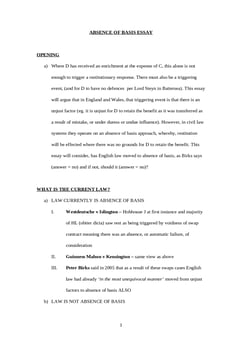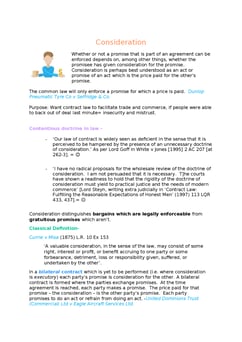Royal Bank of Scotland v Etridge (No 2) [2001] 4 All ER 449
Judgement for the case Royal Bank of Scotland v Etridge (No 2)
Table Of Contents
W’s husband got her to agree to a charge on the matrimonial home as collateral for the husband’s indebtedness and when the bank, B, tried to reclaim the house, W claimed undue influence so that she was voiding her agreement to the charge.
HL allowed some of the claims (there were 8 cases here) on the facts and rejected others.
Lord Nicholls
-
The aim is to prevent one person abusing their influence over another. The types of relationship to which this can apply are ones of sufficient trust and confidence and do not have to conform to a particular type.
Proof that A placed trust in B in relation to A’s financial affairs +
A transaction that calls for explanation = prima facie (i.e. rebuttable) presumption of undue influence.
There are also certain classes of cases where the court conclusively presumes that one party held influence over the other e.g. child and guardian, solicitor and client etc. With these, the claimant merely has to prove the existence of the relationship (e.g. “he is my solicitor”) and NOT the degree of trust and confidence.
HOWEVER, husband-wife is NOT one of the relationships to which this conclusive presumption applies.
Whether the complainant receives outside advice as to the effect of the agreement is evidence to be taken into account with such weight as is considered appropriate given the circumstances. However a full understanding of the implications alone does not disprove undue influence.
A transaction requiring explanation (requirement no. 2 - see above) is one where "the gift is so large as not to be reasonably accounted for on the ground of friendship, relationship, charity, or other ordinary motives on which ordinary men act”, and in such a case “the burden is upon the donee to support the gift." (Lindley LJ in Allcard).
This requirement is the true meaning of Lord Scarman’s “manifest disadvantage” requirement (i.e. the phrase “manifest disadvantage” shouldn’t be used: too confusing) because to allow a relationship of trust alone to create the presumption would be ridiculous e.g. a child giving its parent a present.
The courts should be cautious about finding undue influence: hyperbole on business projections, what a reasonable husband might say etc should not constitute undue influence. However inaccurate descriptions by the husband of the arrangement IS an abuse of influence. Also commercial certainty requires that generally such contracts of surety are upheld.
-
In order for a wife to escape the guarantee she has to:
Prove a vitiating factor, e.g. undue influence;
The creditor knew that the loan was non-commercial and not for the guarantor’s benefit (Nicholls says that a married-couple relationship using their house as a guarantee fulfils this); and
L has not taken reasonable steps to inform the guarantor of his/her possible liability and risks (e.g. recommend independent advice or, in cases of “heightened risk” inform the guarantor itself directly).
There are no special status for sexual relationships, but a bank will be “put on inquiry” (i.e. have to take reasonable steps to inform the guarantor) wherever the relationship between guarantor and borrower is non-commercial.
Lord Clyde
He shuns the division of actual and presumed undue influence.
----
McKendrick: Majority approved the actual-presumed distinction, though there was some difference in deciding what actual undue influence meant- Lord Nicholls said it was “improper pressure or coercion”, similar to duress, whereas Lord Hobhouse said it was an equitable wrong consisting of “some express conduct overbearing the other party’s will”.
HL asserts that presumed undue influence raises a rebuttable presumption, although Scott, and Hobhouse (contrary to Bingham and Nicholls) reject the use of presumptions in mere relationships of “trust and confidence”, (class 2B) preferring instead to confine presumptions to cases of analogous relationships (class 2A).
Lord Clyde was against all presumptions, therefore future courts will have to choose the better approach to take.
Lord Nicholls also stopped using the “manifest disadvantage” label in favour of Lindley LJ’s approach, though Hobhouse took the contrary view, therefore future courts will have to decide which is best. HL held that husband-wife relationship has no (class 2A) presumption of undue influence.
RELATED CASES
For Further Study on Royal Bank of Scotland v Etridge (No 2)

Contract law notes fully updated for recent exams at Oxford and Cambrid...

A comprehensive guide to some of the key topics in the Restitution of U...
Need instant answers? Our AI exam tutor is here to help.
Ask questions 🙋 Get answers 📔 It's simple 👁️👄👁️
Our AI is educated by the highest scoring students across all subjects and schools. Join hundreds of your peers today.
Get StartedSimilar Cases
Related Product Samples
These product samples contain the same concepts we cover in this case.

 Since 2010, Oxbridge Notes has been a trusted education marketplace, supplying high-quality materials from top achievers at universities like Oxford, Cambridge, LSE, Harvard, and Yale.
Since 2010, Oxbridge Notes has been a trusted education marketplace, supplying high-quality materials from top achievers at universities like Oxford, Cambridge, LSE, Harvard, and Yale.